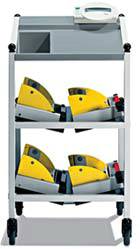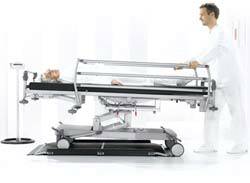Home » Hospital & Durable Medical Equipment » Selecting Bed Scales For Medical Facilities » Selecting Bed Scales For Medical Facilities
Selecting Bed Scales For Medical Facilities

Seca Scale w/ Digital Display & Trolley for Electronic Bed & Dialysis
Retail Price: $7,638.98
Your Price: $7,306.79
 Unit: single
Unit: single

Seca Platform Scale for Gurneys or Stretchers
Retail Price: $6,526.03
Your Price: $5,135.89
 Unit: single
Unit: single
Safety is always a consideration when working in medical facilities. This not only includes safety for the patient but also safety for staff. In situations where a patient is not able to get up on his or her own getting accurate weights can be a safety risk for all involved if the patient has to be moved. One way to avoid these unnecessary safety risks is to use bed scales.
Very popular options for weighing patients that cannot stand or be seated in a wheelchair are the platform scales, also known as a medical stretcher scales. This is similar to a wheelchair platform that allows a rolling bed or stretcher to be pushed up a slight incline onto a platform. These are ideal for weighing patients in emergency rooms or treatment areas of a hospital where the patient is already on a gurney or stretcher. Rolling beds with stretcher types of bases are also a good match for platform scales. Standard beds with the wheels in the four corners of the bed frame will not work since the weight is not able to be centered over the platform.
For patients that are bedridden and in standard four leg frame types of beds there are different models of bed scales available. One that is extremely easy to use for one staff member is very different that what people may imagine. This model uses four separate lifts that are also load cells. The staff simply places the edge of the load cell under one leg of the bed when the bed wheels are in the locked position. The staff uses an easy lift mechanism to slide the load cell under the castor on each of the four legs of the bed.
Once the load cells are positioned and connected the system provides feedback to ensure that everything is correctly positioned before weighing. The bed scales can also store the weight of the bed to immediately tare the system to provide a very accurate reading. The system can be used ongoing to provide continuous readings. This is essential in dialysis and on intensive care units when correct measuring of the loss or gain of body fluids can be critical. With options to set the limits to provide auditory feedback when limit ranges are hit this system provides additional support for staff.
These models of bed scales are designed to sit on a trolley. The four load cells are on the bottom shelves and the monitors and keypad are on the top of the trolley. Everything can be completely secured during transport or when not in use. As these systems are used in critical areas they also are designed with a power back up for storage of data even in the rare event of a power outage to the facility.
Another mobile bed scale option is a stretcher type of device that is mounted on a frame. The stretcher, which is actually more of a soft-sided sling, is positioned beside the patient and lowered to the level of the bed. The patient is then turned to position the sling under the entire body. A hydraulic lift which is controlled by a keypad lifts the sling off the bed's surface to weigh the patient. In addition there is the option to use the tare function to immediately calculate the weight of any bedding that may be covering the patient. This model can be designed for standard weight patients as well as high capacity needs.
All of the various bed scales are designed to be practical to use in a variety of settings. They are also developed with real world applications in mind. One staff member can easily weight bed-ridden patients with all of the model options above, limiting the requirement for multiple staff to complete daily charting for patients in any facility.














